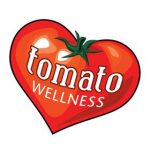What this Dietitian Learned on a Cannery Tour

TOMATOES, PLEASE!!! Watch and share this adorable animated short that shows how tomatoes go from #FieldToSealed within hours, and the community that you support when you buy USA #CannedTomatoes 🍅❤️🥫#TasteOfSummertimeAllYearLong #EndlessSummer #TomatoWellness #FreshThanFresh pic.twitter.com/VWFyxYG69i
— Tomato Wellness (@TomatoWellness) August 26, 2019
By Leslie Schilling, RD
No foods were quite so delicious to me as a tomato sandwich on the beach with my family in the summertime, or my mom’s baked spaghetti loaded with tomato sauce and canned diced tomatoes. In full disclosure, I’ve always been a tomato lover. So, naturally, I was honored to be invited on a tour visiting family farms that produce around 95% of all the canned tomatoes in the United States. We also visited peach and pear farms and learned how many of these beautiful fruits are picked, transported, and canned, in a matter of hours. Let me tell you what I learned about cans, and about myself.
I had canned food amnesia (and I bet I’m not alone).
To be honest, I’d forgotten about canned produce. Between my formal education as a dietitian and a person who has the privilege to buy fresh produce, canned produce had all but disappeared from my grocery list and kitchen. Seeing the process of produce being picked fresh from the field, carefully prepared, and canned, reminded me that I’ve been missing out on the nutrition that canned foods can provide (and sadly, so were my clients). As a dietitian, my clients deserve recommendations that are both nutrient-rich and cost-effective. This tour helped me remember that cans can deliver quality nutrition and reduce the prep time needed to get busy families around a table together. Regardless of your household food budget, canned produce can play a role in every kitchen.
Steel cans are recyclable – 100% recyclable.
My mind was blown on this one. Did you know that a magnet can retrieve steel cans from a kitchen trash bag that ended up in a landfill? That can you never recycled? I didn’t either. Steel cans are retrieved from either landfills or recycling plants and remade into new cans. This makes steel cans a smart choice for families looking to add nutrition and care for the environment we live in.
Nutrition sealed in time.
The canning process is one that has been around for more than a hundred years. While the technology involved in monitoring a cannery may look like a spaceship control center, the process remains simple, clean, and effective. As I watched tomatoes being placed into a rolling water bath, flash-steamed, and promptly sealed, it reminded of why my grandmother canned tomatoes right out of the garden. She’d say they’re fresh now, and they’ll be just as fresh when we open them in the winter.
Not only is the freshness sealed in, the carotenoids that make tomatoes a nutritional powerhouse are amplified. Canned tomatoes are known for their cancer-fighting compound lycopene, which becomes 2.5 times more bioavailable after the canning process. The canning “process” (which is really just steaming or cooking), also brings out valuable nutrients in peaches. Canned peaches have higher levels of vitamin C and folate compared to the fresh fruit.
Using canned foods can help reduce food waste.
These days, commercially canned produce must include a best by date, which is generally 36 months from the date of being sealed. When these canned foods are prepped, ready to open and add to a meal, we can also reduce food waste. Sadly, I’ve thrown away far too many fresh fruits and vegetables that I’ve forgotten or didn’t have time to prepare. Keeping canned produce in mind in our homes may help us add nutritional value and reduce food waste at the same time.
If you forget about the goodness of cans like I did, try to remember the acronym I created to prevent myself from ever experiencing canned food amnesia again.
S – Sealed at the peak of freshness.
T – Takes less time and money.
I – Can improve overall nutrition quality.
R – Can reduce food waste in fully recyclable packaging.
Let’s help families STIR in cost-effective nutrition that’s as fresh as fresh can be.
Big thanks to Pacific Coast Producers for hosting this amazing opportunity to see the harvest and canning process.

Leslie Schilling
Nutrition Counseling for Families
Leslie Schilling owns a Las Vegas-based coaching practice, specializing in nutrition counseling for families, those of all ages with disordered eating concerns, and professional athletes and performers. In addition to running her practice, Leslie serves as a performance nutrition consultant for Cirque du Soleil® and an eating disorder specialist and supervisory consultant for eating disorder treatment centers in Nevada. With her warm, compassionate, and entertaining personality, Leslie been featured in media outlets like Women’s Health, Self, Pregnancy Magazine, The Yoga Journal, Bicycling, BuzzFeed, the Huffington Post, US News & World Report, and on HGTV. You may know her best as the creator of the Born To Eat® approach and co-author of the award-winning book, Born To Eat.


